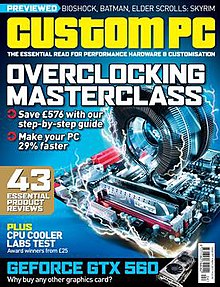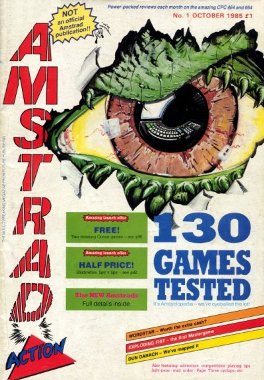
Amstrad Action was a monthly magazine, published in the United Kingdom, which catered to owners of home computers from the Amstrad CPC range and later the GX4000 console.

Case modification, commonly referred to as case modding, is the modification of a computer case or a video game console chassis. Modifying a computer case in any non-standard way is considered a case mod. Modding is done, particularly by hardware enthusiasts, to show off a computer's apparent power by showing off the internal hardware, and also to make it look aesthetically pleasing to the owner.
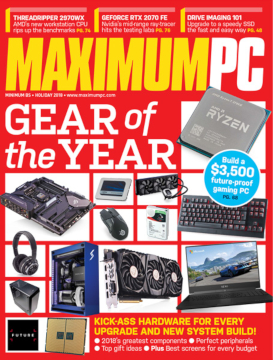
Maximum PC, formerly known as boot, is an American magazine and website published by Future US. It focuses on cutting-edge PC hardware, with an emphasis on product reviews, step-by-step tutorials, and in-depth technical briefs. Component coverage areas include CPUs, motherboards, core-logic chipsets, memory, videocards, mechanical hard drives, solid-state drives, optical drives, cases, component cooling, and anything else to do with recent tech news. Additional hardware coverage is directed at smartphones, tablet computers, cameras and other consumer electronic devices that interface with consumer PCs. Software coverage focuses on games, anti-virus suites, content-editing programs, and other consumer-level applications.

Run was an American computer magazine published monthly by IDG Communications with its first issue debuting in January 1984. Bi-monthly publishing began in June/July 1990, and went on until the magazine folded in November/December 1992. In its heyday, Run's monthly circulation was in the 200,000–300,000 range. Folio, the trade journal of the magazine industry, rated it as the second fastest-growing U.S. magazine of 1985.
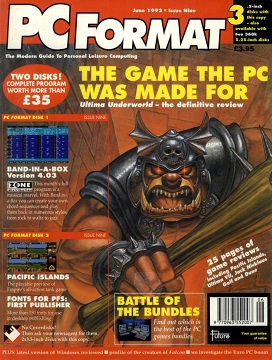
PC Format was a computer magazine published in the United Kingdom by Future plc, and licensed to other publishers in countries around the world. In publication between 1991 and 2015, it was part of Future plc's Format series of magazines that include articles about games, entertainment and how to get the most out of the platform. Despite the occasional mention of alternatives, PC Format takes the term 'PC' to mean a Microsoft Windows-based computer.

GamePro was an American multiplatform video game magazine media company that published online and print content covering the video game industry, video game hardware and video game software. The magazine featured content on various video game consoles, personal computers and mobile devices. GamePro Media properties included GamePro magazine and their website. The company was also a part subsidiary of the privately held International Data Group (IDG), a media, events and research technology group. The magazine and its parent publication printing the magazine went defunct in 2011, but is outlasted by Gamepro.com.

Zero was a video game magazine in the UK, published monthly by Dennis Publishing Ltd. between November 1989 and October 1992. It won the InDin Magazine of the Year award in both 1990 and 1991, and was also briefly the best-selling multi-format 16-bit computer magazine in the UK.

PC Magazine is an American computer magazine published by Ziff Davis. A print edition was published from 1982 to January 2009. Publication of online editions started in late 1994 and continues as of 2024.
bit-tech is an online magazine for computer hardware enthusiasts, gamers and case modders, based in the UK. It was founded in 2000, became a fully professional online publication in 2005, and announced its acquisition by Dennis Publishing in October 2008. Dennis Publishing then partnered the site with existing monthly publication Custom PC magazine, making Bit-Tech the online version of the magazine. At this point the two editorial teams were totally integrated. However, due to a restructure in January 2012 the website and magazine had separate editors again, although several of the writers still contributed material to both publications. It is owned by The Media Team.

TechLife is an Australian general computer magazine, published monthly by Future Australia.

Amstrad Computer User was the official magazine for the Amstrad CPC series of 8-bit home computers. This monthly publication, usually referred to as ACU by its readers, concentrated more on the hardware and technical side of the Amstrad range, although it had a small dedicated games section as well.
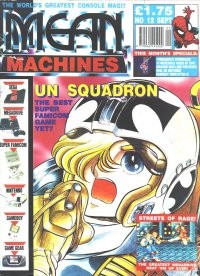
Mean Machines was a multi-format video game magazine published between 1990 and 1992 in the United Kingdom.
Velocity Micro is a privately held boutique computer manufacturer located in Richmond, Virginia (USA), specializing in custom high-performance gaming computers, professional workstations, and high-performance computer solutions. Its extended product line includes gaming PCs, notebooks, CAD workstations, digital media creation workstations, home and home office PCs, home entertainment media centers, Tesla-based supercomputers, and business solutions. All products are custom assembled by hand and supported at the company's headquarters.
Igromania is a Russian video game website and formerly a magazine.
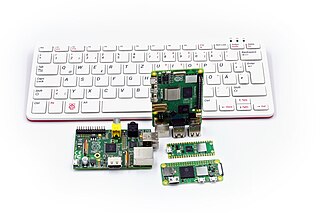
Raspberry Pi is a series of small single-board computers (SBCs) developed in the United Kingdom by the Raspberry Pi Foundation in association with Broadcom. Since 2013, Raspberry Pi devices have been developed and supported by a subsidiary of the Raspberry Pi Foundation, Raspberry Pi Ltd. The Raspberry Pi project originally leaned toward the promotion of teaching basic computer science in schools. The original model became more popular than anticipated, selling outside its target market for diverse uses such as robotics, home and industrial automation, and by computer and electronic hobbyists, because of its low cost, modularity, open design, and its adoption of the HDMI and USB standards.

The Raspberry Pi Foundation is a registered charity in England and Wales, as well as an England and Wales company limited by guarantee. It was founded in 2009 to promote the study of computer science. It is part of a group that comprises legal entities in India, Ireland, and the United States, which carry out educational activities in those jurisdictions; and Raspberry Pi Ltd, a commercial subsidiary that develops Raspberry Pi computers and other hardware. The foundation’s charitable activities are funded through a combination of Gift Aid from the profits of Raspberry Pi Ltd, contracts for the delivery of educational services e.g. professional development for teachers, and donations from individuals, foundations, and other organisations.

Eben Christopher Upton is the Welsh CEO of Raspberry Pi (Trading) Ltd., which runs the engineering and trading activities of the Raspberry Pi Foundation. He is responsible for the overall software and hardware architecture of the Raspberry Pi device. He is a former technical director and ASIC architect for Broadcom.

ZX Spectrum Next is an 8-bit home computer, initially released in 2017, which is compatible with software and hardware for the 1982 ZX Spectrum. It also has enhanced capabilities. It is intended to appeal to retrocomputing enthusiasts and to "encourage a new generation of bedroom coders", according to project member Jim Bagley.

In Win Development, Inc., formerly rendered as In-Win Development and commonly shortened to In Win or InWin, is a Taiwanese computer case and computer power supply manufacturer. In Win was founded in 1985 and has since opened multiple factories and headquarters internationally.
Orange Pi is a brand of single-board computers (SBCs) developed and manufactured by Shenzhen Xunlong Software Co., Ltd. in China. These computers are designed for educators and developers to tinker with electronics, learn programming, and build various projects.
